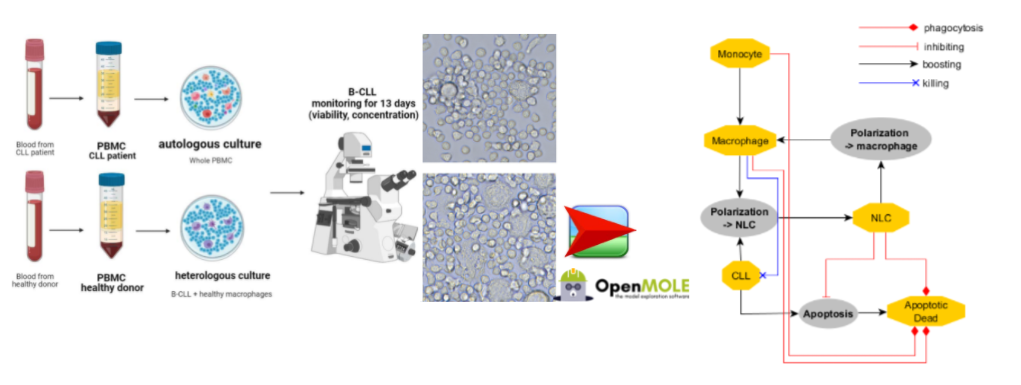
NINA VERSTRAETE
ASSOCIATE INVESTIGATORS : Malvina Marku, Julie Bordenave (Collab. Mary Poupot eq. Laurent)
Modelling of inter-cellular interactions in tumours
In any multicellular system, the ecology, dynamics and stability of each cell population is determined by both the cell-cell interaction and the cell-specific molecular regulation (see Project 3). In a tumour setting, identifying the mechanisms that establish the immune cell – cancer cell interactions is crucial in understanding the tumour behaviour and response. We focus on the ecology of the tumour microenvironment, and particularly on the differentiation of monocytes into tumour-associated macrophages (TAMs) in Chronic Lymphocytic Leukaemia (CLL). TAMs are known to play a critical role in the survival of cancer cells. In CLL, they protect the leukemic B cells from spontaneous apoptosis and contribute to their chemo-resistance. Supported by the wet-lab experiments in-vitro, we built an agent-based model to explore the cell population spatio-temporal dynamics and identify the key processes controlling the stability of this multi-cellular system.
The tumor microenvironment is a collection of immune cells and other healthy cells that surround the cancer cells that make up the tumor. Our goal is to study the interactions between these cells and we have exploited in-vitro co-culture systems to identify the main principles that govern the ecology of different cell types (left and center). In particular, we use an in vitro model of chronic lymphocytic leukemia to study the production of tumor-associated macrophages under controlled conditions. These cells are responsible for treatment resistance in many cancers. We have developed an agent-based model in NetLogo, in which monocytes and cancer cells are agents and their interactions promote the differentiation of monocytes into TAMs and the survival of cancer cells through the protective effect of these macrophages (right).

The tumour microenvironment is a collection of immune and other healthy cells that surround cancer cells constituting the tumour. We aim to study the interactions between these cells and have exploited in-vitro co-culture systems to identify the main principles that govern the ecology of different types of cells (left and centre). In particular we use an in-vitro model of chronic lymphocytic leukemia to study the production of tumour associated macrophages under controlled conditions. These cells are responsible for resistance to therapy in many cancers. We have developed an agent based model in NetLogo, in which monocytes and cancer cells are agents and their interactions promote the differentiation of monocytes into TAMs and the survival of cancer cells thanks to the protective effect of these macrophages (right).
CRCT Chair of Informatics in Oncology (Fondation Toulouse Cancer Sante, Inserm et Pierre Fabre)

